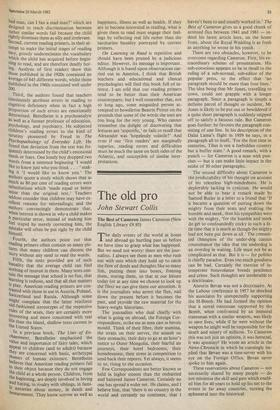The old pro
John Stewart Collis
The Best of Cameron James Cameron (New English Library £9.95)
The daily events of the world at home and abroad go hurtling past us before we have time to grasp what has happened. But we need not worry: there are the jour- nalists. I always see them as men who rush out with nets which they hold up to catch the flow of deeds and thoughts like so many fish, putting them into boxes, freezing them, storing them, so that at our leisure today (or at any time we choose to look up the files) we can give them our attention. It is the journalists who arrest the flux, nail down the present before it becomes the past, and provide the raw material for the heavy-weight historians.
The journalists who deal chiefly with what is going on abroad, the Foreign Cor- respondents, strike me as men cast in heroic mould. Think of their fibre, their stamina, the strain on their nerves, the assault on their stomachs, their duty to go at an hour's notice to Outer Mongolia, their fearful air journeys, their hotel bedrooms, their homelessness, their stress in competition to send back their reports. Yet always, it seems to us, rising to the occasion.
Few Correspondents are better known or held in higher esteem than the embattled and battered James Cameron. Certainly no one has spread a wider net. He claims, and I believe him, that 'there is no country in the world and certainly no continent, that I
haven't been to and usually worked in.' The Best of Cameron gives us a good chunk of arrested flux between 1941 and 1981 — in- deed his latest article here, on the home front, about the Royal Wedding is as fresh as anything he wrote in his youth.
There are two obstacles, however, to be overcome regarding Cameron. First, his ex- traordinary scheme of presentation. His sub-conscious appears to be in thrall to the ruling of a sub-normal, sub-editor of the popular press, to the effect that `no paragraph should be more than four lines.' The idea being that Mr Jones, travelling to town, could not grapple with a longer paragraph. Since a paragraph is simply a definite parcel of thought or incident, Mr Jones is likely to be put out or bewildered if a quite short paragraph is suddenly snipped off to satisfy a fatuous rule. But Cameron goes further: he favours the paragraph con- sisting of one line. In his description of the Dalai Lama's flight in 1959 he says, in a paragraph all to itself, 'For the first time in centuries, Tibet is not a forbidden country but a buffer state.' A good remark, with a punch — for Cameron is a man with pun- ches — but it can make little impact in the midst of 30 other paragraphs.
The second difficulty about Cameron is the predictability of his thought on account of his relentless high-mindedness. He is deplorably lacking in cynicism. He would not be able to bear a remark made by Samuel Butler in a letter to a friend that 'If it became a question of putting down the mighty from their seats and exalting the humble and meek, then his sympathies were with the mighty, 'for the humble and meek do get so confoundedly cocky in such a lit- tle time that it is much as though the mighty had not been put down at all.' The commit- ted champion of the under-dog cannot countenance the idea that the underdog is an overdog in waiting. Life must not be as complicated as that. But it is — for politics is chiefly paradox. Even too much goodness can be bad. Certainly the exercise of in- temperate benevolence breeds pestilence and crime. Such thoughts are intolerable to a doctrinaire.
Aneurin Bevan was not a doctrinaire. At the Labour conference in 1957 he shocked his associates by unexpectedly supporting the H-Bomb. He had formed the opinion that a moral statesman supported by the Bomb, when confronted by an immoral statesman with a similar weapon, was likely to save lives, while if he were without the weapon he might well be responsible for the death and misery of millions. To Cameron this was not just an opinion, it was betrayal, it was apostasy! He wrote an article in the News-Chronicle in which he cunningly im- plied that Bevan was a time-server with his eye on the Foreign Office. Bevan never spoke to him again.
These reservations about Cameron — not necessarily shared 'by many people — do not minimise the skill and guts which enabl- ed him for 40 years to hold up his net to the events in far away countries, turning the ephemeral into the historical.


































 Previous page
Previous page